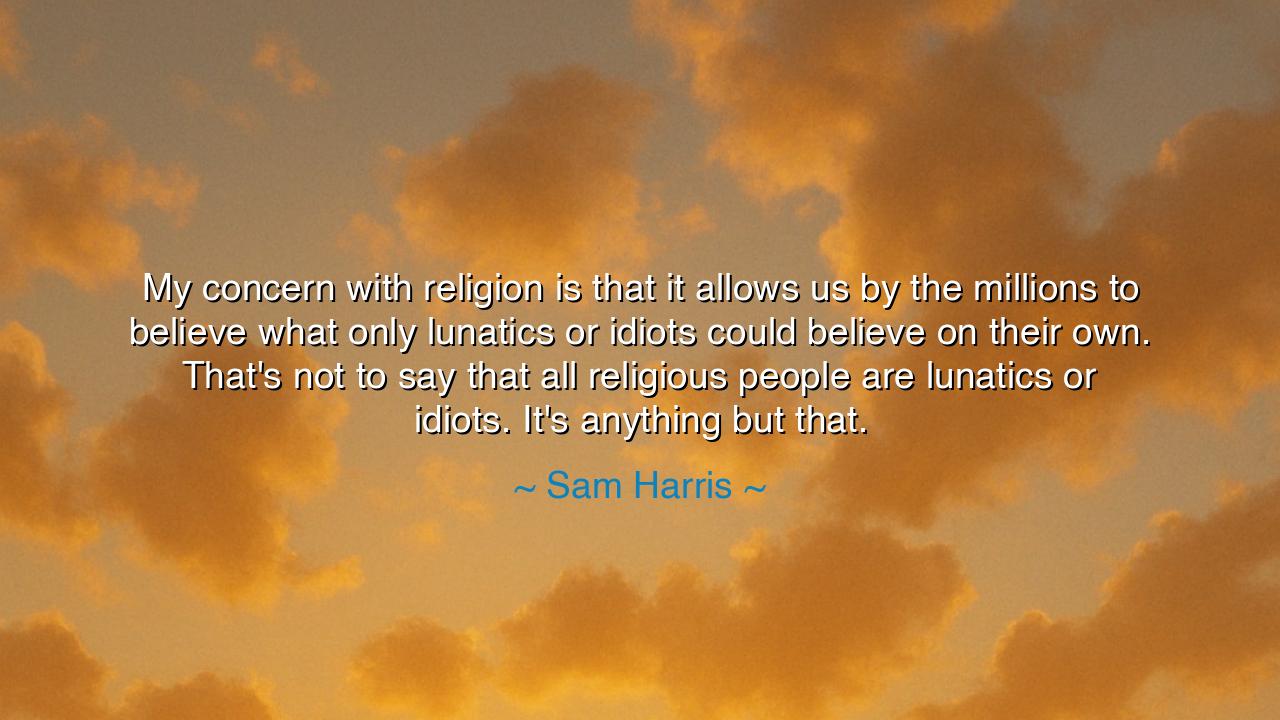
My concern with religion is that it allows us by the millions to
My concern with religion is that it allows us by the millions to believe what only lunatics or idiots could believe on their own. That's not to say that all religious people are lunatics or idiots. It's anything but that.






“My concern with religion is that it allows us by the millions to believe what only lunatics or idiots could believe on their own. That's not to say that all religious people are lunatics or idiots. It's anything but that.” — thus spoke Sam Harris, a modern philosopher and seeker of truth, whose voice rises from the furnace of reason. His words are sharp, yet not cruel; bold, yet not without compassion. In them lies not contempt for faith, but a warning — that when belief is shared unexamined, when multitudes follow what one mind would reject as madness, truth itself becomes the first casualty. Harris does not strike at the heart of spirituality, but at the dangerous shadow cast by blind faith, where thought is silenced and questioning is condemned.
In ancient times, the sages of Greece spoke often of the peril of the mob — how the voice of the many, when guided by ignorance, can drown out the wisdom of the few. Socrates, that greatest of thinkers, was condemned to death not because he did evil, but because he dared to question the gods of his city. The multitude believed that their piety was righteousness; Socrates saw that their belief had become unexamined habit, a comfort mistaken for truth. And so he drank the hemlock, saying, “The unexamined life is not worth living.” Harris, centuries later, echoes this same cry: that belief without reflection is a prison gilded with the illusion of virtue.
When Harris speaks of religion, he does not speak of the longing for the divine — that sacred thirst for meaning that burns in every human heart. Rather, he speaks of the institution of belief, that vast machinery which, throughout history, has transformed love into dogma and wonder into fear. Religion, when corrupted by authority and stripped of humility, gives men the courage to act without conscience, to hate in the name of holiness, to kill with a prayer on their lips. It allows the weak-minded not to think, and the strong-minded not to doubt. And thus, as Harris warns, it multiplies folly until madness becomes respectable.
Consider the Inquisition, that dark age when faith’s fire turned to flame and men were burned alive to preserve “truth.” The same hearts that sought God’s mercy were convinced they were serving His justice. The horror was not born of evil intent, but of unquestioned conviction. That is the danger Harris names — that the human mind, when it abandons reason in the name of righteousness, becomes capable of atrocity while believing it does good. And this danger is not ancient; it walks among us still, wearing new names, but bearing the same blindness.
Yet Harris, in his wisdom, does not say that religious people are fools or madmen. Indeed, he admits that faith can inspire love, art, courage, and compassion — the noblest fruits of the spirit. His concern is that religion, when accepted uncritically, can bind the heart in chains of certainty, preventing it from seeing the greater truth that no scripture can contain. To him, the Divine, if it exists, must be sought through open eyes, not closed ones; through understanding, not obedience. True reverence for truth demands that even the holiest belief be tested against reason, for the sacred is not weakened by scrutiny — only falsehood fears the light.
So what lesson, then, should the seeker take from this? It is not to despise religion, but to purify belief through awareness. If one believes, let it be with eyes open, heart humble, and mind alert. Question not to destroy, but to deepen understanding. Let your faith, if you have it, be a living thing — growing, breathing, changing with the wisdom you gain. And if you do not believe, let your disbelief be compassionate, never scornful, for belief is born of longing, and longing is the mark of the human soul.
In the end, the call of Sam Harris is the same call that echoes through the ages — to awaken. To live not by borrowed truths but by one’s own understanding. To honor reason not as an enemy of spirit, but as its ally. For the gods, if they exist, gave us minds not to be shackled, but to be used. And if there is divinity in us, it is found not in the comfort of unquestioned faith, but in the courage to seek truth, even when it leads us beyond what we have been taught to believe.
So, let the wise remember: faith and reason must walk hand in hand, or both will fall. Believe, if you must — but think as well. For a million unthinking believers can do what one lunatic cannot — they can shape the world in folly’s image. And the only cure for that is not disbelief, but understanding — that sacred flame that burns brightest in the mind unafraid to question.






AAdministratorAdministrator
Welcome, honored guests. Please leave a comment, we will respond soon